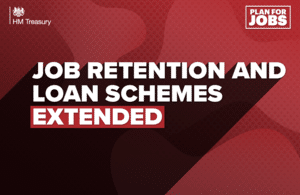
by Iain McIlwee | 17 Dec, 2020 | Insurance, Main News Feed
In a move to ensure firms can access the support they need through continuing economic disruption, Rishi Sunak also confirmed he would be extending the government-guaranteed Covid-19 business loan schemes until the end of March.
These changes come ahead of the Budget, which the Chancellor has confirmed will take place on 3 March 2021. This will deliver the next phase of the plan to tackle the virus and protect jobs, so the extensions to the business loan and furlough schemes enable businesses to plan with certainty and access support in the first few months of the New Year ahead of the further update on wider Covid-19 economic support.
So far, the Coronavirus Job Retention Scheme (CJRS) scheme has protected 9.6 million jobs across the UK with more than one million businesses accessing loans to help them through the crisis.
Chancellor of the Exchequer Rishi Sunak said:
“Our package of support for businesses and workers continues to be one of the most generous and effective in the world – helping our economy to recover and protecting livelihoods across the country.
“We know the premium businesses place on certainty, so it is right that we enable businesses to plan ahead regardless of the path the virus takes, which is why we’re providing certainty and clarity by extending this support, as well as implementing our Plan for Jobs.”
Business Secretary, Alok Sharma, said:
“While our loan schemes have provided a vital lifeline to millions of firms across the country, we know that business owners need additional certainty as we head into the New Year.
“Extending government-backed loan schemes will give companies right across the UK the finance they need to support, protect and create jobs as we build back better from the pandemic.”
The Chancellor said he would review the employer contribution element of the CJRS in January, but decided to bring this forward to allow businesses to plan ahead for the remainder of the winter and the New Year.
The government will continue to pay 80% of the salary of employees for hours not worked until the end of April. Employers will only be required to pay wages, National Insurance Contributions (NICS) and pensions for hours worked; and NICS and pensions for hours not worked.
The eligibility criteria for the UK-wide scheme will remain unchanged and these changes will continue to apply to all Devolved Administrations.
Extending the scheme until the end of April means businesses across the country will have certainty about what support will be available to them.
Businesses will also be given until the end of March to access the Bounce Back Loan Scheme, Coronavirus Business Interruption Loan Scheme, and the Coronavirus Large Business Interruption Loan Scheme. These had been due to close at the end of January.
The schemes have already provided over £68 billion in guaranteed loans, and helped to keep afloat business in all sectors of the UK economy who have been impacted by coronavirus.
We are extending the schemes now, ahead of Christmas and further into the new year, to ensure that businesses can continue to access the support they need to grow and recover.
The government has already announced that more support will be available beyond March, through a successor loan scheme. More details of the scheme will be announced in due course, with the government providing a further update on wider Covid-19 economic support at the Budget on 3 March.
The furlough and loan schemes are part of the government’s wider plan to support, create and protect jobs through its Plan for Jobs. This includes the Kickstart Scheme, more investment in training and skills as well as the Self Employment Income Support Scheme grant, with a fourth grant being made available from February to April 2021.
Applying for a CBILS interruption loan
More on the Coronavirus Job Retention Scheme
Visit the FIS COVID-19 Hub

by Clair Mooney | 16 Dec, 2020 | Main News Feed
“Build the Future” is the theme for the 2021 National Apprenticeship Week (NAW), which will take place between 8 – 14 February 2021. NAW aims to encourage everyone to consider how apprenticeships can help individuals to build the skills and knowledge required for a rewarding career.
The annual week-long celebration of apprenticeships, now in its fourteenth year, takes pleace across England and will showcase the impact apprenticeships can have on communities, local businesses and regional economies and how they all benefit from the impact of apprenticeships.
To support National Apprenticeship Week 2021, individuals, employers, training providers and communities are being encouraged to get involved, to celebrate apprenticeships and how they:
TRAIN apprentices, and future proof their workforce and careers though apprenticeships;
RETAIN apprentices, gaining the skills and knowledge needed by the business, and seeing apprentices thrive, whilst having impact;
ACHIEVE a real return on investment from apprentices; realising the business benefits of apprenticeships, with apprentices progressing in their chosen careers.
A toolkit is available now to support the apprenticeship community with planning their activity for National Apprenticeship Week 2021.
If you have any questions please email: The.Week@education.gov.uk
For updates on National Apprenticeship Week and the campaign follow National Apprenticeship Service on our social media channels:
Twitter: @Apprenticeships
Twitter: @FireItUp_Apps
Instagram: @fireitupapps
Facebook: FireItUpApps
LinkedIn: National Apprenticeship Service
The Week Hashtags: #NAW2021 #BuildTheFuture
For more information on apprenticeships visit: www.apprenticeships.gov.uk
by Clair Mooney | 15 Dec, 2020 | Main News Feed
On Wednesday, 9 December Education Secretary Gavin Williamson MP, announced the first major details of the Lifetime Skills Guarantee.
The Lifetime Skills Guarantee was originally announced by the Prime Minister in September and provides fully funded qualifications to adults without a full qualification at level 3.
Almost 400 level 3 qualifications, including for the finishes and interiors sector; Decorative Finishing – Painting and Decorating, Bathroom Installation Skills, Kitchen Installation Skills, Interior Systems Ceiling Fixing, Plastering, Wall and Floor Tiling, Testing, Inspecting and thorough Examination Occupations – Installing Construction Anchors and Site Testing of Construction Fixings, Occupational Work Supervision, Wood Occupations – Site Carpentry, Bench and Architectural Joinery and Design, Engineer, Construct The Digital Built Environment, will be available free to eligible adult learners in England from April 2021. The qualifications will enable tens of thousands of adults to get the skills they need to improve their career prospects and progress in employment. The courses are backed by £95 million of funding from the £2.5 billion National Skills Fund.
This commitment by the Government to inject funding into tertiary education to ensure the country can bounce back from the COVID-19 pandemic is great news for the construction industry. Construction is one of the sectors that will benefit most from the Lifetime Skills Guarantee and the courses that will receive funding cover a wide range of trades.
Given the potential impact of the pandemic on apprenticeship provision across construction, this new support will help young people to continue to progress their learning in FE. The challenge will be to ensure that learners on FE courses are work ready to enter industry.

by Clair Mooney | 15 Dec, 2020 | Main News Feed
The Scottish government has issued a new Procurement Note – 10/2020 – “Measuring social impact in public procurement”. The policy note serves to clarify the Scottish Government’s policy on measuring social impact through procurement and support for application of this policy in the form of the sustainable procurement duty tools and accompanying guides.
Key Points
- the Scottish Government does not endorse monetary gauges to measure social impact in procurement as part of the procurement process;
- social impact is not fixed or easily transferable. Impact arises from the interaction between supply and demand, and therefore will be specific to the individual, community, and place. Public bodies must engage with communities who have an interest in the contract to get the best possible outcome;
- care should be taken to ensure that impact measurements do not create a barrier to businesses;
- success in contributing to Scotland’s purpose is measured in terms of outcomes. These outcomes align to the National Performance Framework and the UN Sustainable Development Goals; and
- this approach complements procurement principles of relevance and proportionality and Scottish legislation to rule out price only or cost only as the sole award criteria for public contracts.
More information is available at – Measuring social impact in public procurement: SPPN 10/2020 – gov.scot (www.gov.scot)

by Clair Mooney | 11 Dec, 2020 | Main News Feed
Planned to take place from 27-29 January, the aim is to replicate a physical careers fair, virtually. You can visit a wide range of organisations and get advice and support to manage careers and how to take first steps towards them.
The National Careers Service is inviting organisations to take part, and each organisation will have its own ‘stall’. You can choose what to present and how to engage with the audience. Suggestions include:
- Live Q&As
- ‘Day in the life’ streams
- A virtual or live stream tour of your organisation
- A top tips, Frequently Asked Questions webinar
The event will run over three days:
- Wednesday 27 January – For national organisations with opportunities for people across the country.
- Thursday 28 January – For organisations with a more regional audience.
- Friday 29 January – A virtual jobs fair during which regional teams will promote local vacancies and learning opportunities.
If you would like to get involved, please email national.careersservice@education.gov.uk by midday 18 December. The National Careers Service will then give you further details and support. They may need to operate on a first come first served basis, so please register your interest as soon as you can!

by Clair Mooney | 11 Dec, 2020 | Main News Feed
To help reduce the transmission of coronavirus on construction sites, Build UK has partnered with Eurofins to offer a comprehensive
COVID‐19 testing service. Testing is most effective when undertaken in line with a regular schedule; however, it does not replace the need for social distancing or compliance with the Site Operating Procedures. Eurofins is offering both Polymerase Chain Reaction (PCR) and Lateral Flow testing on site at exclusive prices for Build UK members and, to discuss your requirements, please
contact Eurofins.





